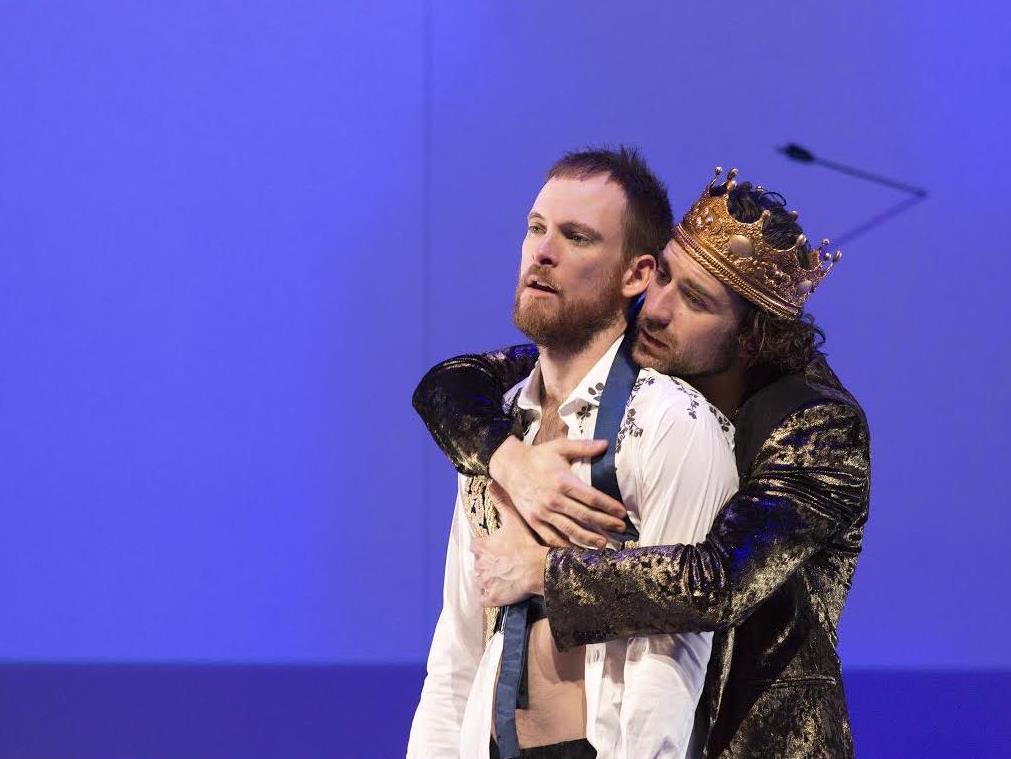Paul Ashcroft as Piers Gaveston & Johnny Carr as Ned in the Malthouse Theatre’s Edward II. Photo by Pia Johnson.
The rarefied inner world of figureheads be they kings, prime ministers or celebrities, anyone who lives a large part of their life in public, is a place that few get to see with any kind of honesty or depth – sometimes not even the subject themselves. The perpetual gaze of the public eye seems to split agency in a way that makes it difficult to truly understand the people behind some of history’s most infamous chapters. It is into this precarious shadow-world that we are thrust by Edward II and made to watch the loves and slights that connect the public and private in this exploration of a king’s unravelling.
The central locus is of course the controversial relationship between King Edward (here called Ned) and the commoner Piers Gaveston which, though unambiguously depicted by Marlowe as one of obsessive love, has never been conclusively resolved. What is not in doubt, is Gaveston’s significant influence in Edward’s court and violent death as a result. Watching Edward II, one is filled with a familiar, yet uncomfortable feeling of watching a friend embark stridently on a destructive relationship wherein the more toxic it becomes, the more deeply they appear drawn to it. The kind of relationship that turns people into the worst versions of themselves. It makes neither Ned nor Piers likeable characters but likeability is rarely a prerequisite for fascination.
If there was genuine intrigue or depth to their relationship it was not readily apparent on opening night and what made the strongest impression was their pettiness. There were brief passages in which Ned’s narcissism was brought to the fore and they were by far his strongest. His rage at Piers’ departure, his ephemeral tenderness at their first reconciliation and his hedonistic mania at Piers death were the undoubted highlights. Piers rarely rose above his pettiness and the subtleties of his influence on the king were notable in their absence.
Tempering the lovers were Edward’s maligned Queen, Sib, and loyal servant to his father, Mortimer. Both had their own axes to grind, in Mortimer’s case quite literally, but it was Sib’s gradual deprivation as both queen and mother that became one of the more interesting arcs. Deprived of love, glory or any return on her assiduity she was the only one of the four principal characters whose fall made a real impact. She managed to appear both vicious and victimised – a combination that lies at the heart of the only possible sympathy for the rich and powerful.
And the sex. There was no shortage of it but it like so much else in Edward II it had rare moments of potency among many that felt like they belonged to ebbing affairs. It was indicative of the decline at the heart of the story but without the bitterness, fire and last gasps of hope that make a fall something to be remembered rather than rushed into the deepest repositories of collective memory. Edward II is much like the era it explores: rich and confident with episodic glamour but ultimately incapable of the greatness it once enjoyed.
Rating; 3 ½ stars out of 5
Edward II
By Anthony Weigh
Direction: Matthew Lutton
Set & Costume Design: Marg Horwell
Lighting Design: Paul Jackson
Composition & Sound Design: Kelly Ryall
Cast includes: Paul Ashcroft, Johnny Carr, Marco Chiappi, Belinda McClory, Julian Mineo and Nicholas Ross
The Malthouse Theatre, Southbank
29 July – 21 August 2016





